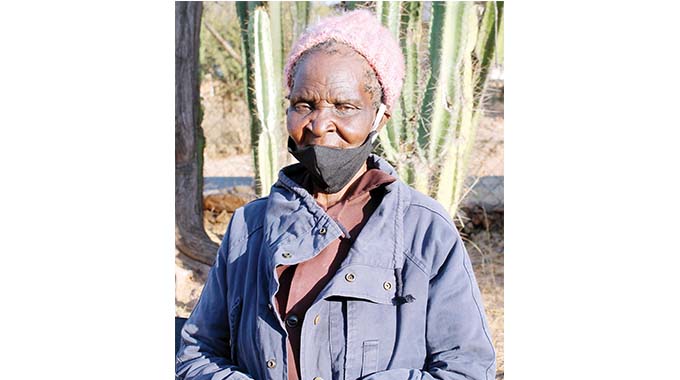76-year-old domestic worker still going strong

Sukulwenkosi Dube-Matutu, Gwanda Correspondent
Garbed in her uniform, 76-year-old Gogo Idah Nyathi takes short steps and sometimes leans on her walking cane as she heads for Gwanda’s city centre where she is employed as a domestic worker.
Gogo Nyathi is a common sight in Gwanda as she makes her way on a journey that seems to take forever. She boards a Zupco bus or kombi from her home in the high-density suburbs to the city centre.
While most of her peers have thrown in the towel as their ageing bodies cannot endure the burden anymore, Gogo Nyathi still soldiers on. Born on November 28 1943, determination, the love for her job and the need to survive has kept her going, even as she turns 77 in three months’ time.
With over 50 years’ experience working as a domestic worker, she has held her current job for about 40 years.
While her ability to work has lessened, Gogo Nyathi, originally from Silonga area in Gwanda, said she can still manage her chores.
“I started working as a domestic worker in 1966 when I was 23 years old after I had left my job at Liebigs Factory in West Nicholson where I had worked for two years. I have worked in several homes in Gwanda Town. I can’t remember the exact number. I have been working at the house where I’m currently stationed for about 40 years now. I can’t remember when I started exactly because it’s been long and my memory is no longer sharp as you can see that I’m very old now,” she said.
“Loyalty, honesty and hard work has helped me keep my job for this long. Wherever I worked I had good relations with my employers. Some of them would relocate and recommend me to their neighbours. The money I have been making over the past years helped me to raise my children as I was a single mother for the greater part of my life,” she said.
Gogo Nyathi said quitting was not an option as she had to survive and also fend for her seven-year-old great grandson she lives with. She said she had five children but three died leaving her with two.
Gogo Nyathi said her surviving children, a son and daughter were both in South Africa. She said she hardly hears from her son while her daughter was continuously assisting her but with the prevailing lockdown, she was unable to send groceries. Gogo Nyathi said she also did not want to be a burden to her daughter as she has her own family to look after which is why she saw it proper to fend for herself.
She said thanks to technology she could perform some of her chores with little sweat.
“I do perform almost all the chores that are done by all domestic workers and believe me I can manage. I wash clothes, clean the house, cook and do the ironing. Luckily, I use a washing machine to do the laundry and when it comes to cleaning the house, I use different electric gadgets such as a vacuum cleaner,” she said.
“As long as the chores that I do require me to stand I have no problem. I only face a challenge when I have to bend or kneel of which I don’t do any chores that require those postures.”
She said her legs were now giving her problems when she walks and she was sometimes forced to use a walking cane.
“I don’t focus on how tired I will be because at the end of the day I want to make money. If I sit at home what will I eat? My right leg has been giving me problems of late and I’m sometimes forced to use a walking cane so that I can get support. I don’t have anyone to fend for me that’s why I fend for myself. When you get old sometimes you become a burden to people because they will be having their own responsibilities and I don’t want to be a burden to anyone. At times some relatives also abandon you,” she said.
“As long as my hands are still working, I will use them to do what I know best. I stay with my great grandchild and the money I use to pay his school fees is the money I earn as a domestic worker. The money I use to put food on the table is the money I work for.”
Gogo Nyathi said she recently started benefiting under the social welfare programme but the money was hardly enough to buy food considering that prices continue to escalate. She said she usually leaves her great grandchild at a neighbour’s house when she goes to work and collects him after she knocks off.
After a hard day’s work she slowly makes her way to the bus rank in the town centre where she boards a Zupco bus or kombi and returns to her home awaiting the following working day. — @DubeMatutu










Comments